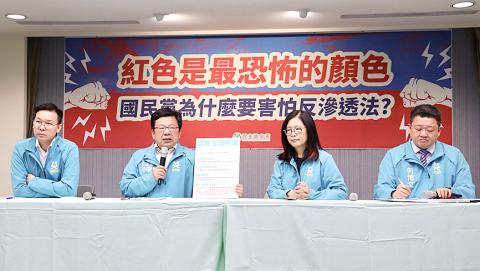The Democratic Progressive Party (DPP) yesterday criticized the Chinese Nationalist Party’s (KMT) opposition of its anti-infiltration bill, saying that the pan-blue camp’s stance on the issue runs against the international community’s mainstream consensus.
It has been well-established in Taiwan, as well as in the international community, that there is a need to protect democracy from infiltration by authoritarian powers, DPP Deputy Secretary-General Lin Fei-fan (林飛帆) told a news conference in Taipei.
However, the KMT has been opposing the DPP’s efforts to counter Chinese infiltration, he said.

Photo: CNA
While the DPP and the New Power Party have proposed three versions of anti-infiltration legislation since May, the KMT has not contributed any, Lin said.
If the KMT considers it important to fight infiltration, it should submit its own version, he said.
Retired lieutenant general Wu Sz-huai (吳斯懷), who is on the KMT’s list of legislator-at-large nominees, would have access to confidential national security information if the KMT garners more than 1.5 million votes in the Jan. 11 legislative election, he added.
Wu sparked controversy in 2016, when he attended a speech in Beijing by Chinese President Xi Jinping (習近平) and stood for a rendition of the Chinese national anthem.
The legislation would provide important protection for Taiwan’s democracy and would require support from all legislators across party lines, Lin said.
At planned cross-caucus negotiations, the DPP is to drop its proposal for the Legislative Yuan to enter a recess from Dec. 18, because a break could postpone reviews of the legislation if the KMT votes against it in today’s legislative session, DPP Legislator Kuan Bi-ling (管碧玲) said.
The DPP plans to propose at today’s session a second reading of its version of the legislation without going through committee review, she said.
Earlier yesterday, the Legislative Yuan’s Internal Administration Committee held a public hearing on the legislation.
National Policy Foundation adviser Charles Chen (陳以信), who is also on the KMT’s list of legislator-at-large nominees, said at the hearing that the DPP was attempting to force through its version of the bill.
As the Executive Yuan would be responsible for implementing the legislation if it becomes law, it should offer its opinion on the bill or submit its own version, he said.
KMT Central Policy Committee deputy director Wu Yu-sheng (吳育昇) said that the DPP’s version of the bill might infringe upon human rights and freedom of the press.
It is inappropriate for the ruling party to propose such a controversial law shortly before it could be voted out of power, he said.
Expedited passage of legislation does not mean the process was reckless, Chien Hsin University of Science and Technology Department of Business Administration professor Yen Chien-fa (顏建發) said, adding: “It is the content that matters.”
The bills address an urgent need to resist China’s interference in Taiwan’s elections, he said.
While they might not be perfect, it is important that the government have legislation in place to make people feel safe, he added.

INVESTIGATION: The case is the latest instance of a DPP figure being implicated in an espionage network accused of allegedly leaking information to Chinese intelligence Democratic Progressive Party (DPP) member Ho Jen-chieh (何仁傑) was detained and held incommunicado yesterday on suspicion of spying for China during his tenure as assistant to then-minister of foreign affairs Joseph Wu (吳釗燮). The Taipei District Prosecutors’ Office said Ho was implicated during its investigation into alleged spying activities by former Presidential Office consultant Wu Shang-yu (吳尚雨). Prosecutors said there is reason to believe Ho breached the National Security Act (國家安全法) by leaking classified Ministry of Foreign Affairs information to Chinese intelligence. Following interrogation, prosecutors petitioned the Taipei District Court to detain Ho, citing concerns over potential collusion or tampering of evidence. The

‘FORM OF PROTEST’: The German Institute Taipei said it was ‘shocked’ to see Nazi symbolism used in connection with political aims as it condemned the incident Sung Chien-liang (宋建樑), who led efforts to recall Democratic Progressive Party (DPP) Legislator Lee Kun-cheng (李坤城), was released on bail of NT$80,000 yesterday amid an outcry over a Nazi armband he wore to questioning the night before. Sung arrived at the New Taipei City District Prosecutors’ Office for questioning in a recall petition forgery case on Tuesday night wearing a red armband bearing a swastika, carrying a copy of Adolf Hitler’s Mein Kampf and giving a Nazi salute. Sung left the building at 1:15am without the armband and apparently covering the book with a coat. This is a serious international scandal and Chinese

Seventy percent of middle and elementary schools now conduct English classes entirely in English, the Ministry of Education said, as it encourages schools nationwide to adopt this practice Minister of Education (MOE) Cheng Ying-yao (鄭英耀) is scheduled to present a report on the government’s bilingual education policy to the Legislative Yuan’s Education and Culture Committee today. The report would outline strategies aimed at expanding access to education, reducing regional disparities and improving talent cultivation. Implementation of bilingual education policies has varied across local governments, occasionally drawing public criticism. For example, some schools have required teachers of non-English subjects to pass English proficiency

TRADE: The premier pledged safeguards on ‘Made in Taiwan’ labeling, anti-dumping measures and stricter export controls to strengthen its position in trade talks Products labeled “made in Taiwan” must be genuinely made in Taiwan, Premier Cho Jung-tai (卓榮泰) said yesterday, vowing to enforce strict safeguards against “origin laundering” and initiate anti-dumping investigations to prevent China dumping its products in Taiwan. Cho made the remarks in a discussion session with representatives from industries in Kaohsiung. In response to the US government’s recent announcement of “reciprocal” tariffs on its trading partners, President William Lai (賴清德) and Cho last week began a series of consultations with industry leaders nationwide to gather feedback and address concerns. Taiwanese and US officials held a videoconference on Friday evening to discuss the